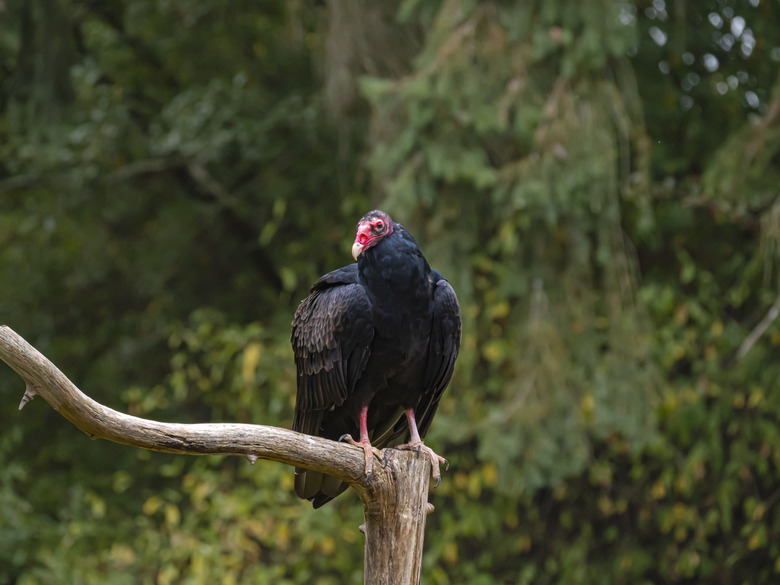How To Get Rid Of Vultures And Buzzards
We may receive a commission on purchases made from links.
You definitely do not want to take, hurt, or kill turkey vultures since they are endangered, and laws protecting them impose impressive penalties. These birds, also referred to as buzzards in the United States, look scary, but they won't hurt you unless you happen to be a carcass. Still, they are large and noisy, and they travel in flocks, you may prefer that they roost elsewhere.
The laws protecting vultures don't make it illegal to scare them, fool them, or make it extremely awkward for them to nest in your yard. If you don't opt to call in a professional wildlife removal company, these are the best options for getting rid of buzzards in your yard.
Buzzards and Vultures
Buzzards and Vultures
In North America, the birds known to scientists as Cathartes aura are called either vultures or buzzards. The two terms are both used to refer to these large, heavy birds that eat the flesh of dead animals. In other parts of the world, carrion-eating birds are termed "vultures," and the name "buzzard" is used to refer to hawks.
To confuse matters even further, there are many kinds of vultures. The turkey vulture and the black vulture are two of the vultures commonly seen in the United States. Both of these species are migratory birds protected under federal law.
Penalties for Hurting Vultures
Penalties for Hurting Vultures
It is forbidden by federal law to take, injure, or kill a turkey vulture; to destroy vulture nests or eggs; or to possess feathers, body parts, or eggs. Anyone breaking this law can be penalized with a significant fine and prison time. Black vultures are also protected from harm, which is the case for some 1,093 other species of birds protected under the Migratory Bird Treaty Act of 1918.
However, the government doesn't require that you put out a welcome mat for these flocking birds. There are humane pest control methods to try. It is perfectly legal to make it difficult for vultures to roost on your house or trees or to scare the vultures to encourage them to move along. Both methods invite creative thinking.
Discouraging Vultures From Roosting
Discouraging Vultures From Roosting
During the day, vultures hunt for food, generally carrion — the fresh corpses of other animals or birds. They are scavengers and generally do not kill to eat. When carrion is scarce, they may dine on garbage in landfills and trash heaps. That doesn't mean that a homeowner wants to see a flock of vultures roosting in the yard. The large, noisy birds with heavy scat are nuisances, and once installed, they can stay for months on end.
Among the best ways of discouraging vultures from roosting on your home or trees is to install physical barriers. Strong bird netting can protect trees and rooftops, although that may take some effort to set up. Another type of physical barrier is the bird spike. These are generally made of steel and install with adhesive, nails, screws, or ties.
Another option to keep birds from roosting is to install electrified bird shock tape. It looks like common adhesive tape but has metal built into it so that it conducts electricity. Attach lines of tape over the vultures' roosting spots and attach this to a bird shock charger. As the birds try to perch, they'll get a short electric shock that will cause them to fly off.
You can discourage vultures from roof roosting by interrupting the process with something unpleasant. One idea is to set up water sprays to drench the roosting spots at irregular intervals. A simpler but more hands-on approach is to shake a tree just as the vulture is landing in it. You'll have to be persistent and conscientious about being in the right place as the vultures soar in.
Encouraging Vultures to Move Along
Encouraging Vultures to Move Along
Vultures are big birds, but that doesn't mean that they are fearless. Vultures are afraid of owls and hawks, and you can use that to your advantage by putting decoys of owls and hawks on nearby trees or attaching them to the roof. You can also purchase recordings of owl and hawk noises that can make the vultures leave the area.
Vultures are also afraid of unexpected noises. Anything loud is likely to scare them, including putting on loud music, clapping your hands together, or smacking pots against each other. For the best effect, do this as the birds land in your yard. Some recommend sonic cannons, but this is not for urban areas since it can frighten birds within a 10-acre space. Other vulture experts suggest starting pistols that bang like real guns but have no bullets.
Taking Sensible Precautions
Taking Sensible Precautions
Be sure you take all sensible precautions to discourage vultures from sticking around. One practical way to keep away any bird is to limit its access to food. This works with vultures too. If you live on a farm or keep stock animals, be sure to dispose of any dead animals immediately after discovering them.
Likewise, don't leave garbage piles around that could be tempting to a vulture. Anything with scraps of meat in it qualifies as inviting, so use plastic bags to contain the odor, attach garbage can lids with bungee cords, and hose down your garbage area regularly to wash away smells.
References
- United States Department of Agriculture: Reducing Damage Caused by Vultures
- Walter Reeves: Buzzards (Vultures) – Control
- U.S. Fish & Wildlife Service: Digest of Federal Resource Laws of Interest to the U.S. Fish and Wildlife Service
- Bird-X: Got Vulture Problems?
- Professional Wildlife Removal: How to Keep Vultures Away – Buzzard Removal
- World Birds: 15 Tips on How to Get Rid of Turkey Vultures [Humanely]
- U.S. Fish & Wildlife Service: Migratory Bird Treaty Act Protected Species (10.13 List) MBTA as of April 2020
